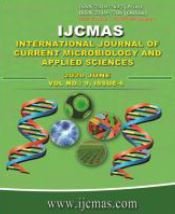


 National Academy of Agricultural Sciences (NAAS)
National Academy of Agricultural Sciences (NAAS)

|
PRINT ISSN : 2319-7692
Online ISSN : 2319-7706 Issues : 12 per year Publisher : Excellent Publishers Email : editorijcmas@gmail.com / submit@ijcmas.com Editor-in-chief: Dr.M.Prakash Index Copernicus ICV 2018: 95.39 NAAS RATING 2020: 5.38 |
Adverse climatic changes and increasing demand of agro produces are forcing abuse of natural and artificial resources resulting not only in deterioration of soil health but also reduction in crop yields. In addition, rainfed crops add to the adversity. In presence of these issues, to increase the yield of majorly grown crops in Yavatmal and Amaravati districts, an effort has been made by following sustainable and integrated crop management practices in two subsequent years i.e. 2016-17 and 2017-18.The practices had a great impact on crop yield and economics in case of pigeon pea, cotton, soybean, wheat and gram. For the year 2016-17 and 2017-18, in case of pigeon pea, cotton, soybean, wheat and gram the overall increase in yield per ha over conventional farming practices was 21.98 and 31.25%, 20.58 and 30.00%, 22.86 and 32.93%, 20.83 and 30.35% 21.55 and 33.99%, respectively. The increase in yield due to integrated crop management approach resulted in additional income of 28.98 and 39.57% in case of pigeon pea, 40.93 and 42.07% in case of cotton, 36.16% and 79.54% in case of soybean, 56.42 and 55.00%in case of wheat and28.25 and 28.34% in case of gram in the year 2016-17 and 2017-18, respectively. The outcome of the study indicated that there is need of awareness amongst farmer community for adopting integrated approach of crop management and a great scope for implementation of integrated, sustainable and holistic approach for crop production in future.
 |
 |
 |
 |
 |